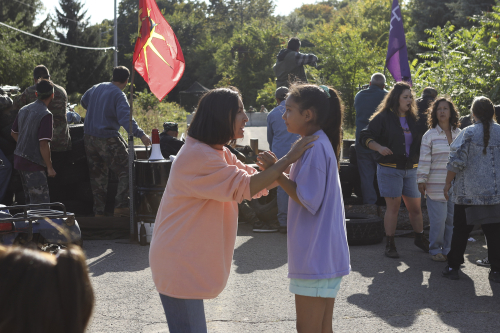
Sébastien Raymond
MOVIE REVIEW
Beans (2021)
“Beans” is the kind of movie that will get passed around between teenage girls the way Judy Blume books did back in the day. It knows things about growing up that kids are eager to learn whether they are ready for it or not. It’s the summer of 1990 and Beans (Kiawentiio) is 12. She lives on the Mohawk side of a small town outside Montreal with her parents and little sister, Ruby (Violah Beauvais, the dictionary definition of irrepressible). Her mother, Lily (Rainbow Dickerson), who is eight months pregnant, has encouraged Beans to apply to a swank private school for grade 7. Beans is clearly smart enough, but she’s still naive. This is the summer she gets her real education.
Writer-director Tracey Deer intercuts Beans’s story with genuine archive footage of what has come to be called the Oka Crisis. It was a real-life standoff between First Nations activists upset that a Mohawk graveyard had been sold to developers and the entire force of the Canadian government, up to and including the army. Barricades on local roads and bridges inconvenience Montreal commuters, but also cut off food supplies to people within the disputed area. Beans’s gentle dad is on the barricades, so the girls spend the summer with their mother, while often and enthusiastically helping out. But then, in the disputed cemetery, Beans encounters April (Paulina Alexis) and her brother, Hank (D’Pharaoh Mckay Woon-A-Tai), an older and rougher pair of kids who scare Beans silly. Kiawentiio radiates goodness in a way that cannot be faked, so the audience’s concern for her as she puts herself into some dangerous situations cannot be faked either. But someone scary is good to know in scary times.
April is around 15, and the friendship that develops between the girls is always age-appropriate, but in the kind of casually violent, crass and thoughtless ways adults don’t like to remember about their own childhoods. April teaches Beans how to box on a pillow duct-taped to a tree, then cuts down a branch and starts switching Beans on the legs, so she can learn how to experience pain without crying. Beans lets her, because April is not doing this to be spiteful or nasty. She is trying to help Beans learn things she already knows, and sometimes it’s fun being a teacher. Their language is foul, and the girls are not always nice to each other even when they’re not drawing blood, but overall April is protective of Beans, especially where Hank is involved. It’s a very difficult trick to pull off but Ms. Alexis does it.
And as if that drama wasn’t enough, one afternoon on the barricades tensions rise so high the locals pull their guns on the Canadian soldiers as everyone screams and curses. But the local women, including Lily, walk right in between the guns in a human chain, literally putting their bodies on the line. Ms. Dickerson embodies Lily’s basic decency in a performance hard to describe, because it feels like there’s no performance in it. She is a good and loving mother, firm in her knowledge of right and wrong and unhesitating in her willingness to articulate it, whether facing down racists in the grocery store or confronting a neighbor who’s bought liquor for the kids. Ms. Dickerson somehow makes it very clear that each time Lily is doing these things, she is making a choice. It would be so much easier for her to sink into the indifferent stupor of April’s dad, or allow herself to be eaten by rage like some of the others on the barricades. But she chooses the right thing, every time.
This makes the gauntlet sequence even more horrifying. It’s been decided to allow women and children behind the barricades to evacuate elsewhere for their own safety. But the caravan of evacuees are stranded on a bridge for hours, must endure invasive searches of their cars at gunpoint and then are forced down a road where the army watches impassively as white racists throw stones. Beans and Ruby crouch, screaming with fear, in the footwells as the windshield cracks, glass shatter into their hair and Lily struggles to stay on the road. It’s no wonder that Beans picks a deeply unpleasant fight with the next white girl she encounters, and it’s no wonder that Lily goes nuclear when she finds out.
But this is where the film loses its power, because it fractures the lessons that it wants Beans to learn. The ways in which April deals with her family, Beans apologizes to her mother, and how everyone decides whether Beans should go to the fancy school involve inconsistent messages. Is it necessary to always behave perfectly so racism can never be justified, or are equal and opposite reactions OK? Do you have to stand your ground no matter what, or is running away sometimes the better choice? Do mothers, even ones as nice as Lily, always know what’s best, or do sullen little girls sometimes have a point? The weight given to the scene over breakfast instead of the finale is a big mistake.
That said, it’s understandable that Ms. Deer might have felt the need to hedge her bets. Women are supposed to let their worth be determined by other people instead of themselves and teenage girls are supposed to be afraid of their own power. But keen and clever audiences – such as 12-year-olds looking for the secret to adulthood – will be able to figure it out for themselves, too. And with any luck, the vile racists in the archive footage have all died of shame.
Comments